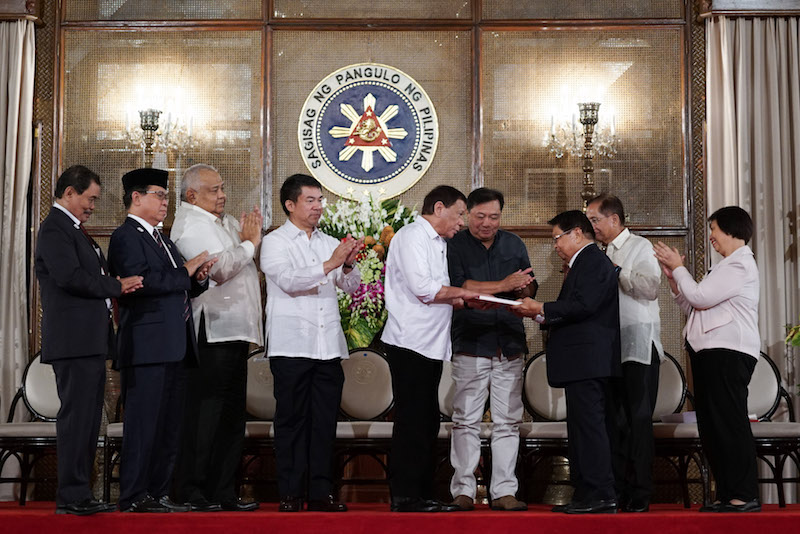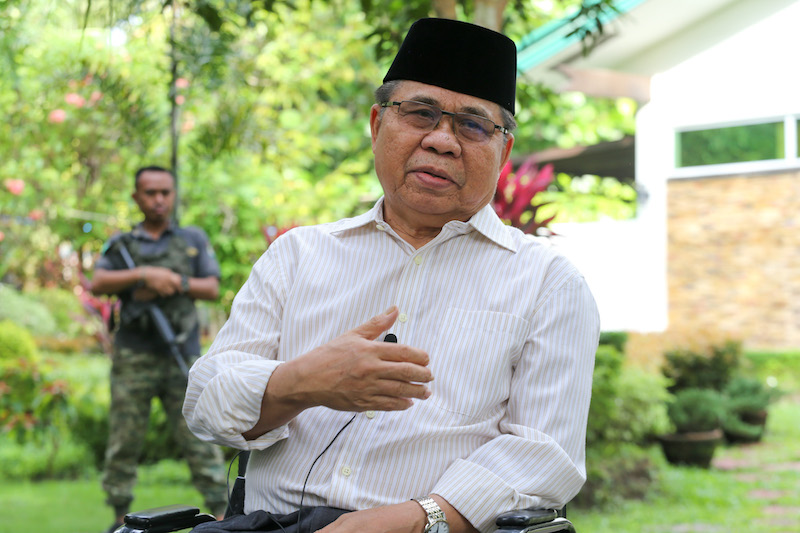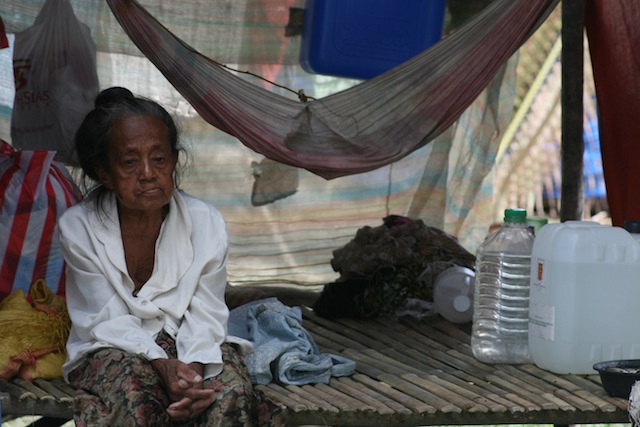DAVAO CITY (MindaNews / 31 May) — The two houses of Congress passed on Wednesday afternoon and in the early hours of Thursday their versions of the Bangsamoro Basic Law (BBL) to pave the way for the abolition of the 28-year old Autonomous Region in Muslim Mindanao (ARMM) in favor of a new political entity that the House of Representatives wants to call “Autonomous Region in the Bangsamoro” and the Senate wants to name “Autonomous Region of the Bangsamoro.”
No celebration greeted the passage of the two versions of what is supposed to be a historic legislation, just words of caution from Al Haj Murad Ebrahim, chair of the Moro Islamic Liberation Front (MILF), the revolutionary front that signed the Comprehensive Agreement on the Bangsamoro (CAB) with the government in the Kalayaan Gardens of Malacanang on March 27, 2014.
“We celebrate today the shared victory of the Bangsamoro and the Filipino people,” Murad said that day in 2014, noting that the CAB “finally brings with it the restoration of the identity, powers and resources of the Bangsamoro. These three things which have been ours since time immemorial, unjustly taken through colonization and occupation, are now returned to us.”
How much of what was returned to them through the peace agreement — the “restoration of the identity, powers and resources of the Bangsamoro” — was lost in the approved BBL versions?
 President Rodrigo Roa Duterte receives a copy of the proposed Bangsamoro Basic Law (BBL) from Bangsamoro Transition Commission (BTC) chair Ghazali Jaafar in a turnover ceremony at the Rizal Hall in Malacañan Palace on July 17, 2017, witnessed by Senate President Aquilino Pimentel III and House Speaker Pantaleon Alvarez, PRESIDENTIAL PHOTO
President Rodrigo Roa Duterte receives a copy of the proposed Bangsamoro Basic Law (BBL) from Bangsamoro Transition Commission (BTC) chair Ghazali Jaafar in a turnover ceremony at the Rizal Hall in Malacañan Palace on July 17, 2017, witnessed by Senate President Aquilino Pimentel III and House Speaker Pantaleon Alvarez, PRESIDENTIAL PHOTO
Murad acknowledged that substantive provisions have either been amended or deleted.
“The struggle is not yet over. We are still hoping to correct those substantial issues either amended or deleted by both houses. We are still hoping improvements could still be done during the BiCam (Bicameral Conference Committee deliberations),” he told MindaNews on Thursday.
In the Senate version, there is no reference at all to “right to self determination,” the essence of the Bangsamoro struggle, as this was deleted from the Preamble. Also deleted were what the Moro have been fighting for and supposedly have won through the CAB: “asymmetrical political relationship”, “principles of subsidiarity and parity of esteem.”
The two versions provide for the abolition of the ARMM upon the ratification of the BBL in a plebiscite likely before the end of the year.
Voting
Senate Majority Leader Juan Miguel Zubiri, principal author of SB 1717, told ANC’s Headstart on Thursday morning that the plebiscite will likely be held “November or December this year.”
Zubiri is principal author of SB 1646 which was drafted by the Bangsamoro Transition Commission (BTC), the body composed of 11 members nominated by the MILF and 10 members nominated by the government, including three from the Moro National Liberation Front (MNLF) faction under Yusoph Jikiri and Muslimin Sema.
Before Congress took a break in March, SB 1646 was substituted by SB 1717 which finally passed on second reading at 12:55 a.m. on Thursday and the third and final reading at 12:58 a.m. after a page-by-page, line-by-line process of amending since Tuesday.
All 21 senators present, from the majority and minority blocs, voted in favor of the BBL. Senator Emmanuel Pacquiao was reportedly abroad while Senator Leila de Lima remains in detention.
The House of Representatives passed on second and third reading the amended HB 6475, the substitute bill to the BTC-drafted BBL bearing the same number, at around 5 p.m Wednesday, some eight hours earlier than the Senate, with 226 voting yes, 11 voting no and two abstentions.
The 11 who voted against are party-list representatives of the Makabayan bloc — Arlene Brosas, Ariel Casilao, France Castro, Emmi de Jesus, Sarah Elago, Antonio Tinio, and Carlos Isagani Zarate, the group claiming the House version has substantially changed the essence of autonomy and self-determination with the deletion or amendment of key provisions — and Representatives Edcel Lagman (Albay, 1st district), Maximo Rodriguez (Cagayan de Oro City, 2nd), Manuel Jose Dalipe (Zamboanga City, 2nd) and Isagani Amatong (Zamboanga del Norte, 3rd).
Of the 11, five are Mindanawons: Casilao, Zarate, Rodriguez, Dalipe and Amatong. Moro representatives voted ‘Yes’ while two Mindanawon representatives abstained — Abdullah Dimaporo (Lanao del Norte, 2nd) and Celso Lobregat (Zamboanga City, 1st). Both had expressed major reservations about the measure and introduced several amendments to the bill.
Under House rules, those who vote ‘No’ cannot be part of the House contingent to the Bicameral Conference Committee that will meet during the break to reconcile the House and Senate versions.
The two houses are supposed to ratify the Bicameral Conference Committee report when they resume sessions on July 23, 2018 before handing this over to President Rodrigo Duterte for signing delivering his third State of the Nation Address on the same day.
Test of constitutionality
On Tuesday night, the deletion or amendment of substantive provisions during the page-by-page, line-by-line deliberations on the Senate floor generated adverse reactions aired through various platforms on social media, that the BBL was “massacred,” “heavily watered down,” “slaughtered,” “chop-chopped.”
Zubiri himself acknowledged in the ANC interview that in the last three days they were “heavily amending” the bill and that this is the reason why he is confident that “it will stand the test of constitutionality.” He explained that the senators inserted several times phrases like “within the framework of the Constitution” or “within the laws and decrees” of the country.
But in the House of Representatives, Speaker Pantaleon Alvarez told reporters on Wednesday that he shared Lagman’s view that the BBL is unconstitutional because there is already an ARMM and that mere legislation cannot abolish the ARMM because it is a creation of the Constitution.
“I share that doubt,” said Alvarez, a principal author of the bill, adding Congress should let the Supreme Court decide on the BBL’s constitutionality.
“Struggle not over”
“We can salvage lost ground at the right time. God willing,” said Mohagher Iqbal, currently chair of the MILF Peace Implementing Panel and concurrent member of the BTC.
“There is still the bicameral conference,” Iqbal said early evening on Wednesday after the House passed its version which also amended or deleted several substantive provisions.
“Our struggle will continue in the Bicameral,” Ghazali Jaafar, MILF 1st vice chair and concurrent chair of the BTC told MindaNews on Wednesday.
On Thursday, MindaNews asked MILF leaders if the versions passed by the House and Senate comply with the CAB, address the historical injustices committed against the Bangsamoro, give them a political entity more than the ARMM, are not ‘watered down’ as feared. How far away is the BTC version from the Senate and House versions? Can these versions help prevent violent extremism as they said the BTC draft would?
Murad said they “do not want to conclude for now” as he explained that “the struggle is not yet over,” that they still hope the substantial issues deleted or amended be corrected, and that “improvements could still be done during the Bicam.
 MILF chair Al Haj Murad Ebrahim says the MILF supports federalism but “there are issues which are peculiar to the Bangsamoro government so we also reiterate our belief that the (peace) agreement is still the best solution to the Bangsamoro problem.” He said Bangsamoro and Federalism can strengthen each other. MindaNews photo by MANMAN DEJETO
MILF chair Al Haj Murad Ebrahim says the MILF supports federalism but “there are issues which are peculiar to the Bangsamoro government so we also reiterate our belief that the (peace) agreement is still the best solution to the Bangsamoro problem.” He said Bangsamoro and Federalism can strengthen each other. MindaNews photo by MANMAN DEJETO
“No comment muna ako sa mga tanong mo. Hindi pa tapos ang process” (No comment on your questions. The process is not over), Jaafar replied.
Iqbal’s initial assessment is it is “definitely more than ARMM,” that “both versions are not bad” but added, “we have to wait for the final version before we can fully evaluate.”
“Epitome of real autonomy”
In her sponsorship speech on May 29, Maguindanao Rep. Bai Sandra Sema, Deputy Speaker for Mindanao, said their version of the BBL “will be the epitome of real autonomy in this country… the precursor of the regional autonomy or federal states that we may consider in the future … the proof that when the government negotiates with its people, it is honest, serious, and committed to carry out its promises.”
BTC Commissioner Mussolini Lidasan thanked members of Congress for passing the BBL, describing it as a “way forward to achieving lasting peace in Mindanao.”
Lidasan acknowledged “it’s still a long way to go” but “I am happy that the BBL version is not a ‘diluted’ one.”
In a statement, ARMM Governor Mujiv Hataman welcomed the passage of the BBL and expressed hope that its final version “will remain true—both to the spirit and the letter—of earlier frameworks and agreements with the stakeholders of the Bangsamoro narrative.”
Hataman said the ARMM will “continue to push for a Bangsamoro Basic Law that is compliant with the previously signed Comprehensive Agreement on Bangsamoro as the passed measure is brought to the table of the bicameral conference scheduled next month.”
“The BBL should bring forth an institution that is capable of responding to the challenge of the times and to the aspirations of the Bangsamoro, unimpaired and free of the maladies that have afflicted the ARMM,” Hataman said.
Between Quezon City and Pasay
While the MILF leadership hopes the bicameral conference could “correct those substantial issues either amended or deleted by both houses,” it may be an uphill battle given the composition of the House and Senate contingents, a number of whom are expected to ensure that what they had amended or deleted from the BTC draft will not be restored in the “reconciled” version that the President will sign into law on July 23. (see Bicam Committee composition)
A MindaNews source describes the gap between the Senate and House versions as “like the distance between Batasan (in Quezon City, where the House of Representatives is located) and Pasay City (where the Senate is located) on the worst traffic days in Manila.”
A matrix of the Senate and House versions compared with the BTC-drafted BBL has yet to be completed but based on the deliberations in the House and the Senate, several proposed “exclusive” powers of the Bangsamoro have been made “concurrent” with the national government, including a number of the powers already exercised by the ARMM.
 WAR-WEARY. A story often told in evacuation centers in conflict-affected areas like Datu Piang in Maguindanao: women can’t remember how many times they have had to flee the war. It’s like a cycle. They fled when they were little, their children fled with them, now their grandchildren are fleeing with them. Photo taken in early October 2008 by Ruby Thursday More / MindaNews
WAR-WEARY. A story often told in evacuation centers in conflict-affected areas like Datu Piang in Maguindanao: women can’t remember how many times they have had to flee the war. It’s like a cycle. They fled when they were little, their children fled with them, now their grandchildren are fleeing with them. Photo taken in early October 2008 by Ruby Thursday More / MindaNews
The two versions ruled out possible expansion of the Bangsamoro, deleting the proposed opt-in plebiscites every five years within a period of 25 years, and in the House version, the six municipalities and 39 barangays that had voted to be included in the expanded ARMM in 2001, can opt to join the Bangsamoro only if their mother units — Lanao del Norte and the towns of the barangays — agree.
On the proposed annual block grant of 6% share (estimated at PhP 72 billion) of the Bangsamoro from the National Internal Revenue of the National Government and collections of the Bureau of Customs the two houses agreed on 5% (around PhP 62 billion) but instead of automatic appropriation, the House wants it released “based on development plans and programs and performance- based criteria as may be prescribed by the Inter-Governmental Fiscal Policy Board.
Maguindanaon lawyer Zainudin Malang, former executive director of the Mindanao Human Rights Action Center described the Senate deliberations as “really painful to watch” and noted how it was a “truly humiliating experience” for members of the BTC to be there.
“It must have been humiliating for the BTC members to sit there, spend hours watching their BBL draft get mangled, page by page, and be powerless and not be able to do anything about it,” he said.
But even as it was painful to watch the proceedings, Malang urged fellow Moros to watch it livestreamed from the Senate because “it is part of Bangsamoro history unfolding right before our eyes. If this still does not convince them of the futility of leaving their fate in the hands of Filipino legislators, then perhaps we deserve to permanently lose what was taken from us,” he said.
Adel Ditucalan, President of the Ranao Watch for Empowerment Network, watched the proceedings at the Senate Tuesday night, “pinned on my chair watching the slaughter.”
“We always knew it would end like this. But even so, the pain is unexpectedly so fierce. It is like watching a horde of ruthless savage men stabbing and stabbing even more an already stillborn babe that refuse to die as fate conspires to keep its soul alive, as meant to be…as willed by God, Himself,” Ditucalan said.
“BBL dies without seeing light of day…,” she lamented.
No celebration but
Fatima Pir Allian, program manager of the Nisa Ul Haqq Fi Bangsamoro (Women for Truth and Justice in the Bangsamoro) wrote there is “no celebration but more work to be done.”
“Let us not be entangled with this gullible feeling of ‘romanticising’ the bills passed last night (House of Rep) and earlier in the senate as a CAB-compliant BBL. NO, it is NOT. It has changed in form and substance. Let us READ before we are jubilant,” Allian said.
Rosslaini Alonto, a member of the Internal Mediation Group, likened the BBL to a patient in critical condition.
“Maraming importanteng parte ang nabawas. Kung ikumpara natin sa pasyente, sa nais nating maitawid sa maliit na butas, malaking parte ng kanyang mga buto at mangilan-ngilang laman loob ang ating tinanggal” (So many important parts were taken out. If we compare it to a patient, in our desire to let him pass through a small hole, we took out a huge part of his bones and internal parts).
“Nasa kritikal na kalagayan ang BBL maski na naitawid na natin. Ito ang sitwasyon na hindi pwedeng magsaya dahil unti-unting namamatay ang pasyente at hindi naman pwedeng ilibing ang pasyente dahil buhay pa ito,” (The BBL is in a critical condition even if we made it pass through. This is a situation where you cannot celebrate because the patient is slowly dying and you cannot bury him because he is still alive.”
“Everyone of us has a role in this most critical stage of the BBL. Everyone must be on guard more than ever, otherwise, patay or forever paralyzed si pasyente” (the patient will die or will forever be paralyzed), Alonto said as she urged fellow Bangsamoro to unite and make everyone understand the current situation.
Alonto is a member of the Internal Mediation Group, a platform for Bangasmoro men and women from various sectors who try to work within their respective organizations to achieve a wider consensus on major Moro issues such as the BBL, federalism and Marawi rehabilitation. (Carolyn O. Arguillas / MindaNews)
